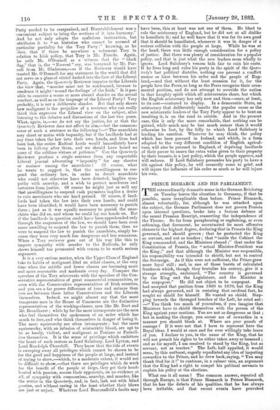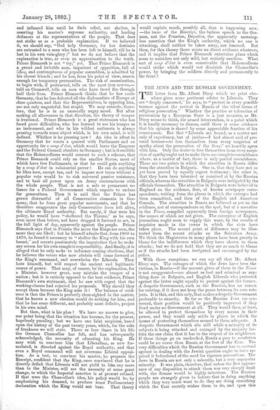PRINCE BISMARCK AND HIS PARLIAMENT.
THE extraordinarily dramatic scene in the German Reichstag on Tuesday leaves the situation in Germany, if that be possible, more inexplicable than before. Prince Bismarck, almost voluntarily, for, although he was attacked upon the subject, the German Parliament does not govern Prussia upon internal questions, broke into a furious defence of the recent Prussian Rescript, reasserting the independence of the Throne. So far from paraphrasing or explaining, or even softening, that document, he accentuated its most offensive clauses to the highest degree, declaring that in Prussia the King governed, and should govern ; that he protected the King as servant, and not as teacher ; that "inside the Cabinet the King commanded, and the Ministers obeyed ;" that under the Constitution of Prussia, the "actual Minister-President was the King ;" and that although the Minister was responsible, his responsibility was intended to shield, but not to control the Sovereign. As if this were not sufficient, the Prince grew more loyal still ; and, in one of those bursts of calculated frankness which, though they brutalise his oratory, give it a strange strength, exclaimed, "The country is governed by the King and the Legislature, and the Minister is the scapegoat." He did not object to be scapegoat. He had accepted that position from 1860 to 1870, but the King had always governed, and in restating that cardinal fact, he sought no shield for himself. He wanted no shield. Step- ping towards the thronged benches of the Left, he cried out : —" You think too much of yourselves, if you imagine that Ministers have to shield themselves with the person of the King against your orations. You are not so dangerous as that ; but in making the charge, you accuse me of cowardice in a manner you should blush at. Where are your proofs of courage ? If it were not that I have to represent here the Royal ideas, I would at once and for ever willingly take leave of you. I declare to you, in the name of the King, that he will not permit his rights to be either taken away or lessened ; and as for myself, I am resolved to stand by the King, but as servant, not as teacher." The Left, half appalled, it would seem, by this outburst, eagerly repudiated any idea of imputing cowardice to the Prince, and he drew back, saying, "You may thank God for it !" to continue, in a calmer vein, an argument that the King had a right to compel his political servants to explain his policy at the elections.
What can it all mean ? The common answer, repeated all through Europe, is that Prince Bismarck is Prince Bismarck, that he has the defects of his qualities, that he has always been irritable, and that recent events have provoked
and inflamed him until he finds relief, not shelter, in asserting his master's supreme authority, and hurling defianc,es at the representatives of the people. That does not strike us as a probable explanation. If we believed it, we should say, "God help Germany, for her destinies are entrusted to a man who has been left to himself, till he is lost in his own vain-glory ;" but we do not believe that the explanation is true, or even an approximation to the truth. Prince Bismarek is not "fey," yet. That Prince Bismarck is a proud and irritable man, impatient of opposition, full of W3pG, and contemptuous of popular assemblies, is admitted by his closest friends ; and he has, from his point of view, reason enough for temporary provocation. The risk of assassination, to begin with, if protracted, tells on the most iron nerves,— told on Cromwell, tells on men who have faced fire through half their lives. Prince Bismarck thinks that he has made Germany, that he has defeated all the diplomatists of Europe at close quarters, and that the Representatives, in opposing him, are not only ungrateful, but stupid. We may concede, there- fore, that he is in an unusually angry mood. But after making all allowances in that direction, the theory of temper is irrational. Prince Bismarck is a great statesman who has faced great difficulties, who has learned to use his temper as an instrument, and who in his wildest outbursts is always pressing towards some object which, in his own mind, is well defined. Whither is he pressing now ? An idea is afloat in Germany that he wants a quarrel with Parliament and an opportunity for a coup d'elat, which would leave the Emperor and the Federal Council absolute in Germany ; but is it credible that the Hohenzollerns would consent to such a scheme, that Prince Bismarck could rely on the smaller States, most of which have free Parliaments, or that he could gain anything by a coup d'e'tat in substantial power ? He can do anything he likes now, except tax, and to impose new taxes without a popular vote would be to risk universal passive resistance, and to base all power upon an Army conterminous with the whole people. That is not a safe or permanent re- liance for a Federal Government which expects to endure for generations. Then it is said that the Prince has grown distrustful of all Conservative elements in Ger- many, that he fears great popular movements, and that he therefore exaggerates the only Conservative force left alive, the ultimate Royal authority. But surely, if that were his policy, he would have "sheltered the Throne," as he says, even more than before, not have dragged it forward to act, in the full light of day, apparently against the people. Prince Bismarck says that in Prussia the more the Kings are seen, the more they are liked ; but he himself admits that, from 1860 to 1870, he found it necessary to "shelter the King with his own breast," and resents passionately the imputation that he seeks any screen for his own complete responsibility. And finally, it is alleged that he only seeks to influence coming elections, that he believes the voters who now abstain will come forward at the King's command, and overwhelm the Liberals. They hate himself, but will respect the ancient and legitimate source of power. That may, of course, be the explanation, for a Minister, however great, may mistake the temper of a nation ; but it is entirely opposed to the best evidence, Prince Bismarck's own statement, that he saw with regret that the working-classes had rejected his proposals. Why should they accept them because the King asks it ? The balance of evid- ence is that the Prince is perfectly clear-sighted in the matter, that he knows a new election would do nothing for him, and that he has some different, and probably most definite, project in his own mind.
But then, what is his plan ? We have no answer to give, our point being that the situation has become, for the present, hopelessly puzzling ; but we have one faint suspicion, based upon the history of the past twenty years, which, for the sake of frankness we will state. Three or four times in his life the German Chancellor has felt, and has subsequently acknowledged, the necessity of educating his King. He may wish to convince him that Liberalism, as now for- mulated, is directed against the Royal authority, and that even a Royal command will not overcome Liberal opposi- tion. As a test, to convince his master, he prepares the Rescript, confident that the King, once convinced that he is directly defied, that Liberals will not yield to him any more than to the Minister, will see the necessity of some great change, to which the Imperial sanction is at present refused. If that were the Chancellor's idea, his policy would be, by emphasizing his demand, to produce some Parliamentary declaration which the King would not bear. That theory
would explain much, possibly all, that is happening now, —the issue of the Rescript, the furious speech to the Ger- man, not the Prussian, Deputies, the apparently meaning- less assertion that the King's authority, which no one is attacking, shall neither be taken away, nor lessened. But then, for this theory there exists no direct evidence whatever, and it implies that Prince Bismarck entertains plans which seem to outsiders not only wild, but entirely needless. What sort of coup d'e'tat is even conceivable that Hohenzollerns would strike which would not diminish the Chancellor's power, by bringing the soldiers directly and permanently to the front ?







































 Previous page
Previous page